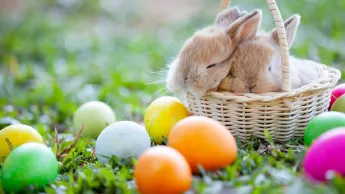Easter in Germany – a springtime tradition
- 2012-03-28
- Elena Krüskemper
- Comment

For many German families, Easter is the first occasion to go outside to celebrate after a long winter. The children hunt for Easter eggs in the garden, while the adults go for walks to enjoy the mild spring air. Germans maintain many traditions and customs that make Easter, the most important Christian feast, an enjoyable affair. However, some now complain that it is becoming increasingly commercialised.
Have you ever heard of egg striking? Or read Goethe’s Easter Walk? For thousands of years Germans have welcomed the first major religious feast of the year with a whole range of traditions and customs. Here on Alumniportal Deutschland the Germany-Alumni are also talking about these Easter activities.
‘Contented, great and small shout joyfully: Here I am Man, here dare it to be!’ These lines are from the poem ‘Easter Walk’ by Johann Wolfgang von Goethe. It's a rather apt description of how Germans feel when Easter finally comes, heralding the advent of spring after a long cold winter. Parks and gardens beckon them to leave their warm scarves and hats at home and enjoy the first rays of sunshine together with friends and family.
Deutsche Welle: All You've Ever Wanted to Know About the Easter Bunny
Easter traditions
At Easter, Christians celebrate the resurrection of Jesus Christ. However, modern-day Easter traditions still contain traces of even older pagan rituals. Dying eggs, for instance, goes back to a pre-Christian symbol of fertility. Over the centuries a variety of regional Easter traditions developed across Germany, some of which are still lovingly kept alive today.
One popular tradition that is still very much alive today is Easter egg hunting. Children especially love hunting for Easter eggs in the garden or around the house on Easter Sunday. Some families also hide nests containing small gifts, or they hold competitions at the breakfast table in which two people knock the tips of their hard-boiled eggs together and the one whose egg stays whole is the winner. Depending on the region, this tradition is known as ‘ticken’, ‘düpfen’, ‘ditschen’, ‘tüppen’ or ‘kitschen’.
Have you heard of this game? Or did you come across any other unusual or amusing Easter games and customs during your stay in Germany? Join the Alumniportal Deutschland to discuss these and other customs. Why not share your experience of Easter in Germany, or tell your fellow Germany-Alumni from other countries how Easter is celebrated in your own country?
Deutsche Welle: Easter Culinary Traditions in Europe
Ethical Easter purchases in Germany
In Germany some people are increasingly concerned that Easter is becoming more and more commercialised. Not long after Christmas, the shops are filled with Easter-themed sweets and decorative items. These are often really expensive and hardly match up to standards of sustainability and responsible consumerism. Various animal protection and fair trade groups take a critical stance on this issue. There’s so much more to Easter in Germany than chocolate and stuffed toy rabbits!
